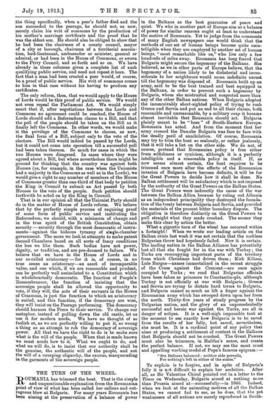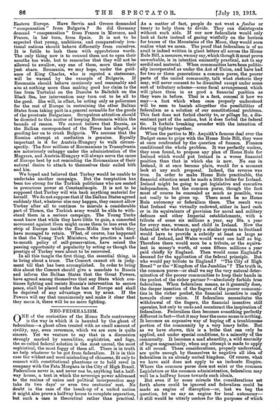THE TURN OF THE WHEEL. R OUMANIA_ has trimmed the boat.
That is the simple and unquestionable explanation from the Roumanian point of view of what has been called her callous and out- rageous blow at Bulgaria. For many years Roumania has been aiming at the preservation of a balance of power in the Balkans as the best guarantee of peace and quiet. We who in another part of Europe aim at a balance of power for similar reasons ought at least to understand the motive of Roumania. Yet to judge from the comments of many English newspapers one would think that the methods of one set of human beings become quite unin- telligible when they are employed by another set of human beings, "most remarkable like us," who live only a few hundreds of miles away. Roumania has long feared that Bulgaria might secure the hegemony of the Balkans. She believed, as we in other parts of Europe believe, that the hegemony of a nation likely to be dictatorial and incon- siderate to her neighbours would mean indefinite unrest till the hegemony was disposed of. Roumania built up an army, said to be the best trained and best equipped in the Balkans, in order to prevent such a hegemony by Bulgaria, whom she mistrusted and suspected more than any of the other Balkan nations. When Bulgaria adopted the inconceivably short-sighted policy of trying to rush Greece and Servia and put an end to all their claims, both reasonable and unreasonable, by a military coup it became almost inevitable that Roumania should act. Bulgaria plainly meant to be "boss " of South-Eastern Europe. Roumania has acted. And from the moment that her army crossed the Danube Bulgaria was face to face with the deadly peril of annihilation. Of course, Roumania may try to trim the boat so zealously, or rather jealously, that it will take a list on the other side. We do not, of course, pretend that Roumanian policy is free either from selfishness or cynicism, although it is a perfectly intelligible and a reasonable policy in itself. If, as now seems almost certain, the boat requires to be trimmed once more after the effects of the Roumanian invasion of Bulgaria have become definite, it will be for the Great Powers to decide how it shall be done. No Balkan settlement will be satisfactory which is not imposed by the authority of the Great Powers on the Balkan States.
The Great Powers were indirectly the cause of the war between the Balkan Allies, because by ruling out Albania as an independent principality they destroyed the founda- tion of the treaty between Bulgaria and Servia, and provided the materials of the present bitter boundary dispute. The obligation is therefore distinctly on the Great Powers to pull straight what they made crooked. The sooner they make this clear by action the better.
What a gigantic turn of the wheel has occurred within a fortnight ! When we wrote our leading article on the Balkan crisis last week it was not certain that the reckless Bulgarian throw had hopelessly failed. Now it is certain. The leading nation in the Balkan Alliance has potentially lost all that she fought for in the war with Turkey ; the Turks are reoccupying important parts of the territory from which Christians had driven them ; Kirk Kilisse, Lule Burgas—names immortalized in the recent struggle of the Cross against the Crescent—are once again occupied by Turks ; we read that Bulgarian officials have been taken as prisoners to Constantinople, although Turkey is not officially at war with Bulgaria ; Greece and Servia are trying to dictate hard terms to Bulgaria, and Bulgaria cannot so much as lift a finger against the Roumanian army which has swooped down upon her from the north. Thirty-five years of steady progress by the Bulgarian nation, and the glory of an unprecedentedly successful and heroic war against the Turks, are all in danger of eclipse. It is a well-nigh impossible task at the moment to see exactly how Bulgaria is to be saved from the results of her folly, but saved, nevertheless, she must be. It is a cardinal point of any policy that aims at producing a settlement of content in the Balkans that Bulgaria should not be crushed. The Great Powers must also be trimmers, in Halifax's sense, and create the perfect balance. If not, we may see the most cruel and appalling working model of Pope's famous epigram :— "See Balkans balanced : neither side prevails,
For nothing's left in either of the scales."
To explain is to forgive, and in spite of Bulgaria's folly it is not difficult to explain her ambition. After all, as Sir Valentine Chirol pointed out in a letter to the Times on Wednesday, Bulgaria aimed at nothing more than Prussia aimed at—successfully—in 1866. Indeed, when we look at the animating motives of all the Balkan States, we cannot fail to see, as he does, that the pet weaknesses of all nations are merely reproduced in South- Eastern Europe. Have Servia and Greece demanded " compensation " from Bulgaria ? So did Germany demand " compensation " from France in Morocco, and France, in her turn, from Spain. It is not to be expected that young, ambitious, and comparatively irra- tional nations should behave differently from ourselves. It is futile to lash them with opprobrious words. The only thing now is to counsel them not to open their mouths too wide, but to remember that they will not be allowed to swallow, any one of them, more than their just share. Roumania, we may hope, under the guid- ance of King Charles, who is reputed a statesman, will be warned by the example of Bulgaria. If Roumania should behave cautiously and reasonably and aim at nothing more than making good her claim to the line from Turtukai on the Danube to Baltchik on the Black Sea, her intervention may turn out to be all to the good. She will, in effect, be acting only as policeman for the rest of Europe in restraining the other Balkan States from taking part in a general scramble for the goods of the prostrate Bulgarians. Scrupulous attention should be directed to this matter of keeping Roumania within the bounds of reason. We cannot believe that Russia, as the Balkan correspondent of the Times has alleged, is goading her on to crush Bulgaria. We assume that the Russian attempt at mediation is genuine. Equally important is it for Austria-Hungary to walk circum- spectly. The four millions of Roumanians in Transylvania are notoriously unhappy under the administration of the Magyars, and Austria-Hungary will always serve the cause of Europe best by not reminding the Roumanians of their natural desire to attach to themselves their exiled kith and kin.
We hoped and believed that Turkey would be unable to undertake another campaign. But the temptation has been too strong for the Turkish politicians who are seated in precarious power at Constantinople. It is not to be supposed that Turkey will win back anything material for herself. We do not suppose that if the Balkan States agreed suddenly that, whatever else may happen, they cannot allow Turkey after all to continue to misrule a considerable part of Thrace, the Turkish army would be able to with- stand them in a serious campaign. The Young Turks must know that while they have little to gain, a concerted movement against them might cause them to lose even the strip of Europe inside the Enos-Midia line which they have managed to retain. What, of course, has happened is that the Young Turk Ministers, who practise a hand- to-mouth policy of self-preservation, have seized the passing opportunity of popularity by acting as though the prestige of Turkey were about to be recovered.
In all this tangle the first thing, the essential thing, is to bring about a truce. The Concert cannot sit in judg- ment till that has been accomplished. In order to bring this about the Concert should give a mandate to Russia and inform the Balkan States that the Great Powers, have agreed among themselves that any State which con- tinues fighting and resists Russia's intervention to secure peace, shall be placed under the ban of Europe and shall be deprived of any advantage won by arms. If the Powers will say that unanimously and make it clear that they mean it, there will be no more fighting.











































 Previous page
Previous page